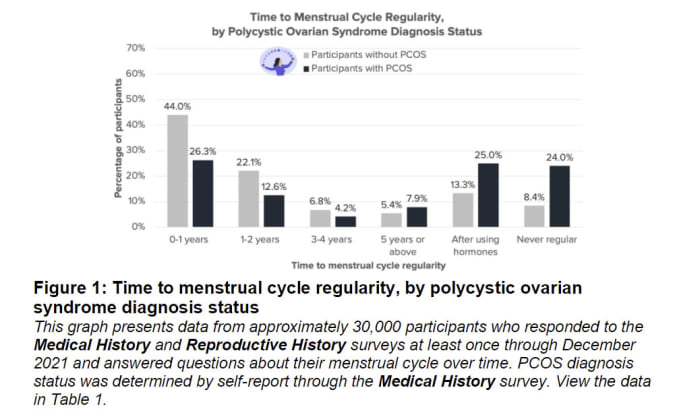Apple continues to release findings from its ongoing Women’s Health study, and is announcing updated results today ahead of International Women’s Day (March 8th). The report, published on Harvard’s website, reveals some insights on polycystic ovary syndrome (PCOS) and cardiovascular health, based on data from more than 37,000 participants.
Apple and Harvard found that its participants who had received PCOS diagnoses tended to be diagnosed between ages 14 and 35, with the median age being 22 years old. They were also more likely to report a family history of the syndrome and have unpredictable menstrual cycles after their first periods.
According to the report, more than 70 percent of participants without PCOS diagnoses said their menstrual cycles became regular within four years of their first period, while just 43 percent of those with PCOS experienced the same. In fact, 49 percent of participants with PCOS diagnoses never had regular menstrual cycles or only got regularity after using hormones.
The study also looked at the health conditions related to PCOS. It reported that participants with PCOS diagnoses were four times more likely to have pre-diabetic conditions, three times more likely to have Type 2 diabetes and twice as likely to have high blood pressure and high cholesterol. It also said irregular heartbeats or arrhythmia was more common among participants with PCOS diagnoses than those without.

Apple Women’s Health Study – Harvard T.H. Chan School of Public Health.
Apple did caution that these were preliminary insights. Data was gleaned from medical history surveys completed by more than 37,000 participants enrolled from November 2019 through December 2021. Of those who completed the medical history surveys, about 30,000 also filled out reproductive history surveys and answered questions about their menstrual cycles over time.
According to co-principal investigator Dr. Shruthi Mahalingaiah, “The Apple Women’s Health Study is one of the first studies where we can look at the connection between menstrual health, polycystic ovary syndrome, and heart health at a population level.”
Mahalingaiah also said “Despite the association between PCOS and heart-related conditions, historically, research studies about heart health have not included information about menstrual cycles,” adding that the study “is important for having a better understanding of PCOS and its health impacts, including for people with PCOS and those that might have PCOS, but do not know.”
Looking forward, Apple and Harvard want to “create a larger foundational data set on PCOS, with self-tracked variables, and its connection with heart health.”
“Our hope is that by expanding the understanding of the public health burden of PCOS, we can create research models that can be applied to further scientific understanding of other health conditions and the burden of other diseases,” Mahalingaiah said.
All products recommended by Engadget are selected by our editorial team, independent of our parent company. Some of our stories include affiliate links. If you buy something through one of these links, we may earn an affiliate commission.




